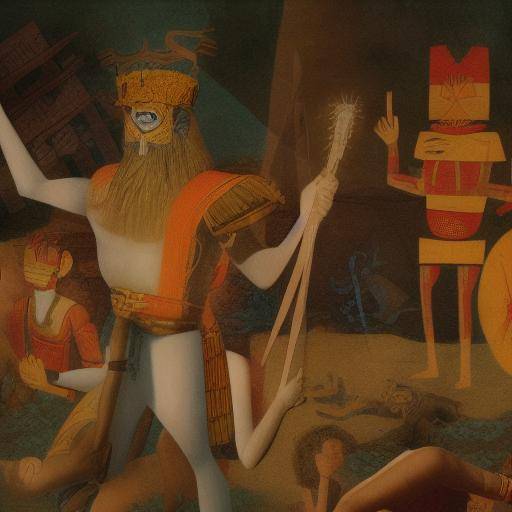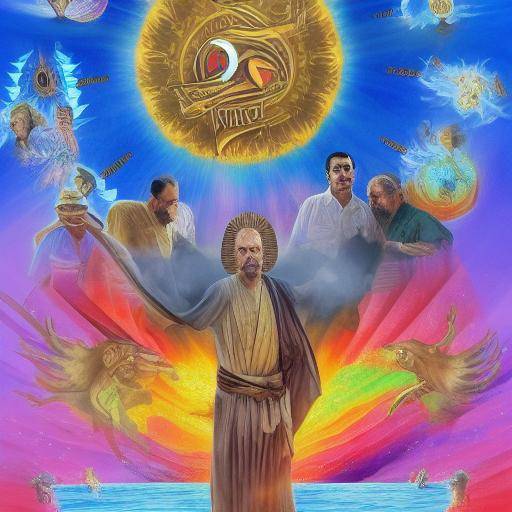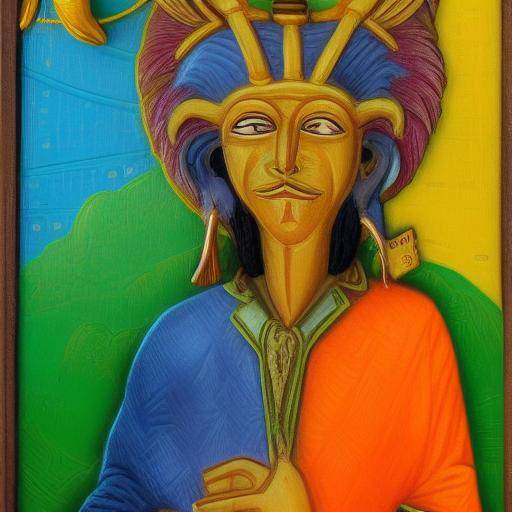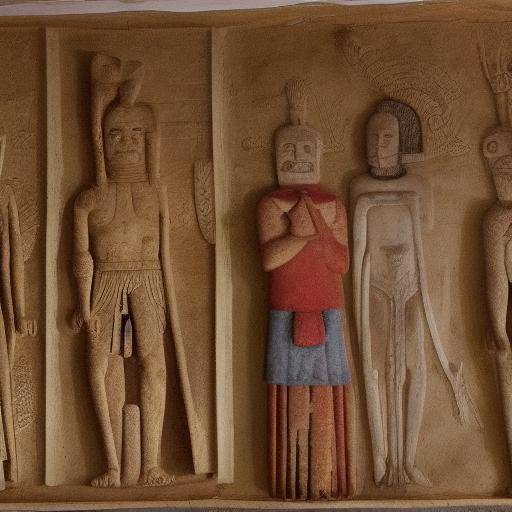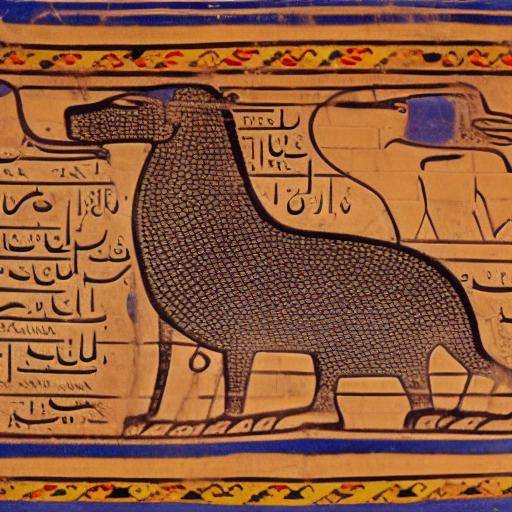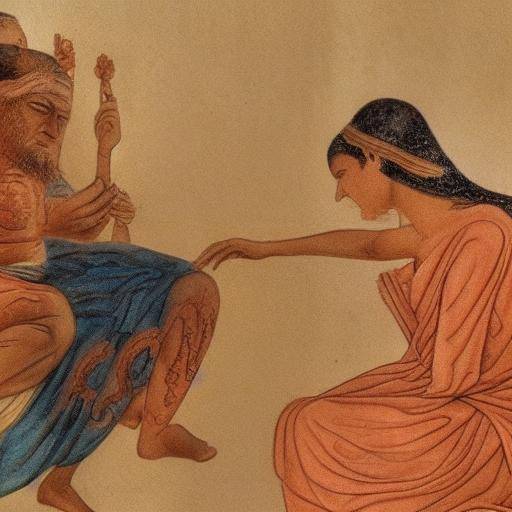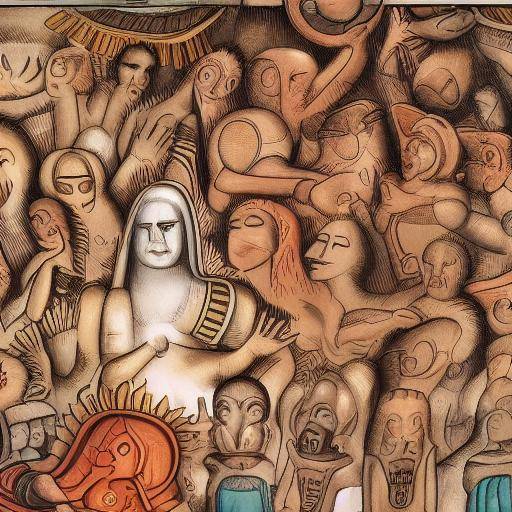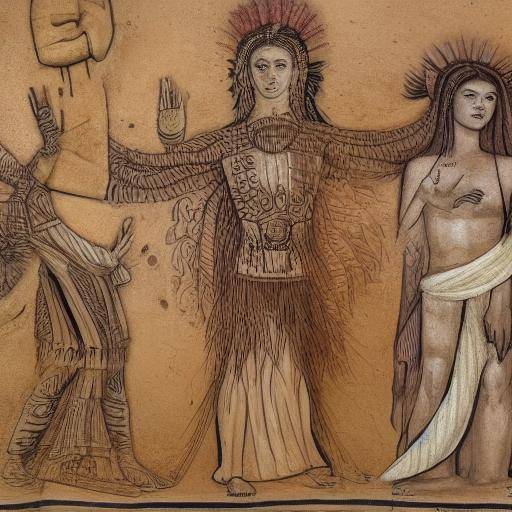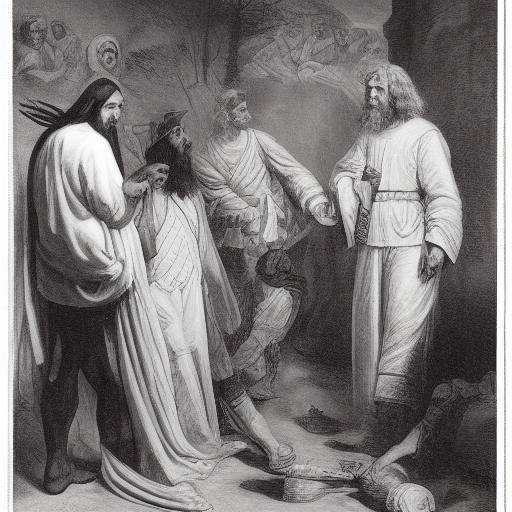
The Egyptian gods, their myths and cults, represent one of the most fascinating and lasting religious structures in ancient history. Diving into Egyptian mythology is getting into a rich world of deities, stories and religious practices that continue to amaze researchers and passionate about history. In this article, we will extensively explore Egyptian mythology, the gods that make up it, and the cults that were dedicated to them, unraveling their history, meaning and relevance.
Introduction
The Egyptian gods, protagonists of one of the most transcendental mythologies of ancient times, have left an impressive legacy in terms of cultural, religious and artistic influence. From Ra, the sun god, to Osiris, the god of agriculture and rebirth, these divine beings have captivated entire generations. Join us on a journey through time as we explore the complex stories, cults and the importance of the Egyptian gods in ancient civilization.
History and Background
Origins of Egyptian Mythology
Egyptian mythology, an amalgam of gods and stories of origin, originates in ancient Egypt, one of the oldest and most sophisticated civilizations in history. Its rich cosmogony developed over millennia, influenced by a variety of geographical, political and cultural factors.
The worship of the Egyptian gods dates back to prehistory, with evidence of religious practices dating back more than 6000 years ago. The first signs of worship of deities such as Osiris and Hathor are found in funeral ceremonies and agricultural rituals, which laid the foundation for the further development of Egyptian mythology.
Evolution of Egyptian Mythology
As ancient Egypt expanded and consolidated its empire, Egyptian mythology experienced constant development and expansion. New gods emerged, merged or were relegated, reflecting changes in society and political power.
Egyptian mythology reached its highest splendor during the New Empire period, with deities such as Amon-Ra, Isis and Horus acquiring unprecedented importance. The Pharaohs, as representatives of the gods on Earth, used mythology to legitimize their government and maintain social order.
Historical and Legacy Importance
Egyptian mythology not only played a crucial role in the religious sphere, but also influenced the everyday life, architecture, art and literature of ancient Egypt. The Egyptian gods were represented in temples, graves and objects of daily use, reflecting the deep penetration of religion in Egyptian society.
His legacy endures to this day, with numerous representations of Egyptian gods in popular culture, literature and arts. In addition, the influence of Egyptian mythology extends to other religious and mythological traditions, demonstrating its global reach.
Analysis in Deep
Meanings and Adoration Temples
The Egyptian gods covered a wide range of attributes and meanings, from solar power to fertility and death. Each deity occupied a unique place in Egyptian cosmology, reflecting the complexities of life and nature. The temples dedicated to the gods were centers of worship and ritual activity, where priests and faithful paid tribute to their divinities.
Ritual and Cult
The worship of the Egyptian gods was manifested through intricate rituals and ceremonies, designed to honor and please the deities. Offers, prayers and festivities were carried out in honor of the gods, seeking to secure the divine favor and maintain the cosmic balance. These rituals played a crucial role in the social and spiritual life of ancient Egypt, consolidating the connection between human beings and the divine.
Comprehensive review
Comparison of Egyptian Dioses
Egyptian mythology presents a diverse panoply of gods, each with unique attributes and symbolisms. From Anubis, the guardian of the dead, to Bastet, the feline goddess, each divine entity embodied specific aspects of human and natural existence.
Analysis of Egyptian Mythology vs. Other Mythologies
Compare and contrast Egyptian mythology with other mythological traditions, such as Greek, Nordic or Mesopotamian, reveal similarities and differences, deepening our understanding of the beliefs and narratives of different cultures.
Influence in Modern Culture
The legacy of Egyptian mythology becomes evident in contemporary culture, from references in films and video games to their presence in literature and art. The iconography of the Egyptian gods continues to inspire artists and creators around the world, perpetuating their influence in today's society.
Practical Tips and Accessible Recommendations
Respect for Egyptian mythology
In exploring Egyptian mythology, it is essential to address it with respect and cultural sensitivity, recognizing its importance for ancient and contemporary society. To value your legacy implies understanding and appreciating your historical context and symbolic meaning.
Perceptions of Experts and Future Visions
Perspectives of Archaeologists and Historians
Scholars of Egyptian mythology provide valuable insights into their importance in the understanding of ancient civilization, unraveling their complexities and their continuing relevance in the academic realm.
Future Interest Predictions
Given the lasting fascination with Egyptian mythology, your study and appreciation are expected to continue to evolve, finding new forms of expression and understanding as time progresses.
Conclusion
In short, Egyptian mythology and the gods that make up it represent an inexhaustible wealth of stories, symbols and meanings that have transcended the millennia. His cult, both in antiquity and in modern culture, reveals a profound connection between humanity and the divine, perpetuating a lasting legacy that continues to captivate successive generations.
Frequently asked questions
Who were the main Egyptian gods?
The main Egyptian gods include Ra, Osiris, Isis, Horus, Anubis, Thoth, Ptah, Bastet, Hathor, and Seth, among others. Each had unique attributes and represented aspects of life and nature.
What was the purpose of the Egyptian temples?
The Egyptian temples served as places of worship, rituals and offerings to the gods. They also functioned as administrative and economic centres in Egyptian society.
How did Egyptian mythology influence art and architecture?
Egyptian mythology was an inexhaustible source of inspiration for the art and architecture of ancient Egypt. The temples, tombs and statues were decorated with scenes and iconographs related to the gods and their myths.
What was the role of priests in the Egyptian religion?
The priests played a crucial role in maintaining religious rituals, preserving sacred knowledge and caring for temples and ritual objects. They were the direct connection between the gods and the community.
Why was Egyptian mythology important in ancient society?
Egyptian mythology provided a narrative framework that explained the origin of the world, nature and human life. It also gave legitimacy and cohesion to society, and offered comfort and hope in times of difficulty and loss.
What is the current relevance of Egyptian mythology?
Egyptian mythology continues to be the subject of study and interest in fields such as history, archaeology, comparative religion and popular culture. Its presence in contemporary society demonstrates its validity and capacity to inspire through the centuries.
How is Egyptian mythology represented in popular culture?
Egyptian mythology is represented in films, books, video games, artworks and entertainment products, serving as a source of fascinating stories and powerful symbols that capture the public's imagination.
External Links
- Egyptian Museum in Cairo
- The British Museum - Ancient Egypt
- The Metropolitan Museum of Art - Egyptian Art
With these additional resources, expand your understanding of Egyptian mythology and its impact on history and culture.
This comprehensive analysis of Egyptian mythology, the gods that make up it and the associated cults presents a holistic view of one of the most enduring and fascinating religious traditions in history. As he continues to captivate the curious minds and scholars, his legacy intertwines with that of humanity, transcending time and space.
With its remarkable influence on culture, art, religion and history, Egyptian mythology continues to captivate current generations, offering a window to an ancient world full of mystery and wonder. Welcome to the fascinating cosmogony of the Egyptian gods, where time and eternity intertwine in a tapestry of timeless myths!

